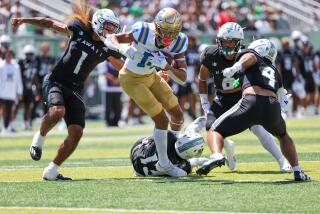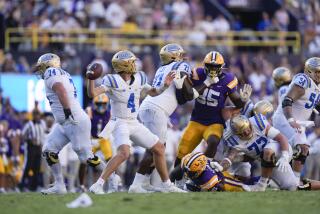Karp’s Wise Investment Decision Results in Much Personal Growth
Three years ago, Josh Karp turned down a $1.9-million signing bonus from the Atlanta Braves and accepted a baseball scholarship to UCLA.
It was an agonizing decision for an 18-year-old who grew up in a Seattle suburb with the dream of pitching in the major leagues.
Many thought he was foolish to reject such a lucrative offer.
“Even I questioned whether he was doing the right thing,” UCLA Coach Gary Adams said.
There were risks. An injury could end his career. Lack of improvement could diminish his draft status.
It didn’t deter him from leaving Bothell, Wash., and coming to Westwood. He made the choices: dorm room over hotel room; classmates over minor league teammates; studying world history over studying scouting reports.
Karp was convinced that college life would better prepare him for his baseball future and provide experiences more valuable than a big bank account.
“There were two things I wanted most--to grow as a person, then as a player,” he said.
Too many teenagers think they’re ready to go straight from high school to professional ball and end up failing badly because they are not mentally and physically prepared for the challenges.
“If you can’t take care of stuff off the field, you’ll never be able to do your job on the field,” Karp said.
Over the last three years, Karp has received lessons he’ll savor. They’re the kind of cherished moments that have given him a foundation to be a major leaguer and much more.
It’s an hour before USC plays UCLA at the Rose Bowl. More than 80,000 spectators are filling the stadium. Karp is on the field with a couple of his closest friends. He begins to realize he could be watching his final USC-UCLA football game as a student.
“We were taking pictures and I was taking it all in and it was a touching moment because I was like, ‘This really means something being here, supporting our school, being with my friends,’ ” he said. “Coming from Seattle, I didn’t know anyone. All the friends I’ve met, these are friends I’ll have the rest of my life.”
Karp, 21, is 6 feet 5, 195 pounds. He throws a fastball 93 mph. He has a curveball that is close to major-league quality and a change-up that could be his best pitch.
In two seasons at UCLA, the junior right-hander is 18-5 with 170 strikeouts in 172 innings. During the summer, he pitched for the U.S. national team and went 3-0 with a 1.82 earned-run average.
He began this season rated with USC pitcher Mark Prior and Georgia Tech third baseman Mark Teixeira as one of the top three prospects for the June amateur draft.
Adams is more complimentary, insisting, “I can project him as not being just a big leaguer but a Hall of Famer.”
Last year’s top three picks signed for $3 million, $2.5 million and $2.75 million, respectively. The Minnesota Twins, Chicago Cubs and Tampa Bay Devil Rays have the top three picks in this year’s draft.
Karp, who pitched two scoreless innings Saturday in UCLA’s 10-6 loss to UC Riverside, understands what’s at stake.
“I’m ready,” he said. “I’m definitely excited. There is some pressure, but I think I’m prepared.”
Much has changed since he arrived as a freshman.
“I could just imagine being out in ‘A’ ball somewhere in the middle of nowhere, living by myself, playing with people I have no idea who they are, having to do all this stuff, wash laundry, take care of yourself, find a place to live, transportation, then be able to play baseball successfully,” he said.
He has mastered time management, from studies to baseball, from social skills to paying bills.
Karp is a history major. One of his favorite books is “The Secret History” by Procopius, a fifth-century historian who chronicled the lives of the Byzantine emperors. From Procopius, Karp found a lesson that relates to baseball.
“Procopius had this idea that Justinian was a horrible ruler and couldn’t do anything right for the people,” he said. “He was just one person, where the whole society regarded Justinian as this powerful leader who designed all these laws that remain in Europe today for the most part.
“Reading Procopius’ point of view on Justinian made me realize no matter what you do, there’s always going to be people that do not think you’re doing the right thing. I can relate to that because no matter how good I do or maybe I mess up once, there’s always going to be someone looking and seeing what you’re doing and writing about you or evaluating you like scouts. You have to live your life and do what you have to do as long as it’s good for you and you don’t have to try to impress other people.”
Adams said there are few parents who would have allowed their child to turn down $1.9-million out of high school.
“Including Mr. and Mrs. Adams,” he said.
But Joe and Pamela Karp have college backgrounds and trusted their son’s judgment and instincts.
“They had a firm grasp of what college meant,” Karp said. “Yeah, money is great, but money isn’t everything. Money isn’t the answer to happiness.”
Karp is enrolled in a social welfare class. The professor’s lectures are making him examine issues he never considered.
“She talked about class, gender, racial tensions that are present today and the divisions,” he said. “It makes you recognize and appreciate what you have and makes you understand what people don’t have.”
Coming to Los Angeles for college opened Karp’s eyes and gave him a sneak preview of what to expect when he reaches the major leagues.
“This is such a diverse area,” he said. “You get to experience all these different cultures, then you go into the classroom and learn about it and you say, ‘I can relate it to this in real life.’
“I’ve been presented with situations where I’ve had to deal with different types of people, different characters and be able to relate. I think that helps you be more well-rounded so when I go out into the baseball world, I’m going to have to deal with different coaches, different managers, different owners, different shortstops, different catchers. It all relates.”
Karp said he has no regrets about passing on a lottery-size paycheck for a college education.
“I felt I had it in me to stay healthy, to continue to grow as a baseball player and a person,” he said. “I wouldn’t trade it for anything even if they would have paid me more money. This is definitely where I needed to be. I’ll have this for the rest of my life.”
*
Eric Sondheimer can be reached at his e-mail address: [email protected]
More to Read
Go beyond the scoreboard
Get the latest on L.A.'s teams in the daily Sports Report newsletter.
You may occasionally receive promotional content from the Los Angeles Times.







